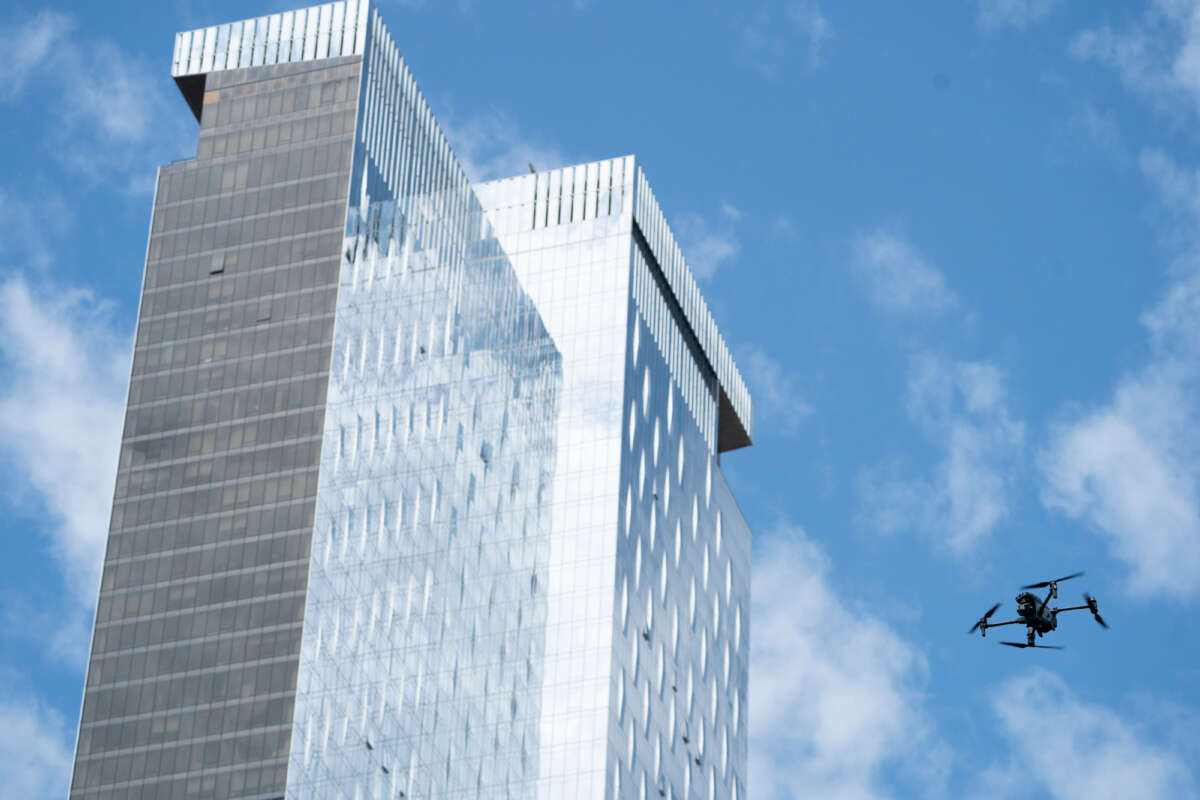Truthout is a vital news source and a living history of political struggle. If you think our work is valuable, support us with a donation of any size.
The New York City Police Department (NYPD) is planning to use surveillance drones to patrol large gatherings, including private parties and barbecues, this Labor Day weekend.
“If a caller states there’s a large crowd, a large party in a backyard, we’re going to be utilizing our assets to go up and go check on the party,” Kaz Daughtry, the assistant NYPD Commissioner, said at a press conference.
Civil liberties groups and privacy advocates have said that such drone use may violate existing laws that regulate police surveillance in the city. One such law is the Public Oversight of Surveillance Technology (POST) Act, which requires that the NYPD disclose its surveillance tactics at least 90 days prior to implementation.
“It’s a troubling announcement and it flies in the face of the POST Act,” Daniel Schwarz, a privacy and technology strategist at the New York Civil Liberties Union, told the Associated Press. “Deploying drones in this way is a sci-fi inspired scenario.”
When the NYPD first announced its drone program, the department vowed that it wouldn’t use the technology for “warrantless surveillance” — but the department’s decision to use drones to surveil private parties seems to fly in the face of this promise. New York City’s mayor, Eric Adams (D), has said that he wants to see the NYPD increase its use of drones, and has cited Israel’s use of the technology as a blueprint for the city, despite the fact that Israel’s police drone program has been roundly condemned by human rights organizations.
“Clearly, flying a drone over a backyard barbecue is a step too far for many New Yorkers,” Cahn told the Associated Press.
The NYPD has used drones in a limited capacity for years, deploying unmanned aircraft systems for search and rescue missions, to document crime scenes, and to monitor large public events, like New Year’s Eve in Times Square. The department has dispatched drones for what it says are public safety and emergency purposes 124 times this year. Last year, police drones were used only four times.
“One of the biggest concerns with the rush to roll out new forms of aerial surveillance is how few protections we have against seeing these cameras aimed at our backyards or even our bedrooms,” Albert Fox Cahn, executive director of the Surveillance Technology Oversight Project (STOP), told the Associated Press.
Around 1,400 police departments across the country currently use drones in some capacity, according to a recent report by the American Civil Liberties Union (ACLU). The report anticipates that drone use by police departments is “poised to explode.”
“American police departments have begun making the case that they should be permitted to fly drones broadly across cities and towns for purposes such as responding to emergencies, but they are already being used far more broadly than many realize, and their use is likely to broaden even more,” the ACLU report states. “We recommend that communities put in place statutory guardrails to ensure that drone use does not overspill reasonable limits.”
Holding Trump accountable for his illegal war on Iran
The devastating American and Israeli attacks have killed hundreds of Iranians, and the death toll continues to rise.
As independent media, what we do next matters a lot. It’s up to us to report the truth, demand accountability, and reckon with the consequences of U.S. militarism at this cataclysmic historical moment.
Trump may be an authoritarian, but he is not entirely invulnerable, nor are the elected officials who have given him pass after pass. We cannot let him believe for a second longer that he can get away with something this wildly illegal or recklessly dangerous without accountability.
We ask for your support as we carry out our media resistance to unchecked militarism. Please make a tax-deductible one-time or monthly donation to Truthout.
